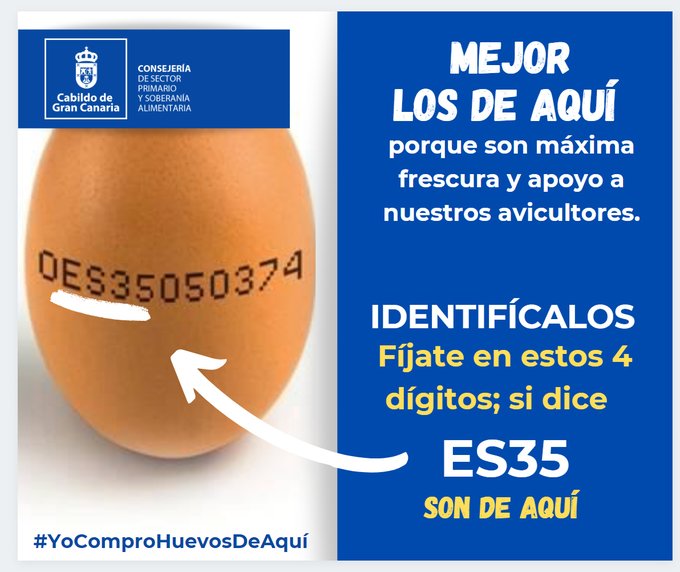For years, the Cabildo de Gran Canaria island government has been promoting food sovereignty, energy self sufficiency, eco-island, buying local produce, and green renewable energies; the Cabildo has continued this trend by launching this week a campaign, in coordination with the Sanitary Defense of Poultry of Gran Canaria Group, with the hashtag #YoComproHuevosDeAquí, loosely translating to “#IBuyEggsFromHere” to promote across social networks consumption of local eggs from the island, which has 21 professional farms stocking 610,000 laying hens that produce around 134 million eggs a year.
Many consumers these days are rightly concerned about “battery” farms which were completely outlawed in 2012 in Spain and throughout Europe, though there are still a lot of caged chickens, the overall direction of travel here on Gran Canaria is away from all sorts of intensive poultry farming and moving more and more towards sustainability and animal welfare. It is a particular focus on the island that food producing animals are healthy and happy, and there is plenty you can do to help encourage a faster transformation to humane production.
 A barcode to tell you what is what?
A barcode to tell you what is what?
Every egg produced at farms here comes with a barcode containing a specific sequence of letters and numbers that let you know the exact origin of the egg. Those produced here include the letters ES meaning it is from Spain followed by the number 35 which corresponds to the province of Las Palmas, these are eggs produced on Lanzarote, Fuerteventura and Gran Canaria. The other six numbers that follow correspond to the type of breeding, producer and livestock operation. Gran Canaria consumes 225 million eggs a year, and the sector still has a growth margin of more than 40% because at the moment we still import, mostly from mainland Spain.
There is a number before the letters ES, which corresponds to the way the chicken is raised and is related to the type of egg it produces. The number 0 means it is Ecological (organic), 1 is for Free-Range and 3 is for more conventional methods. It is also worth noting that Gran Canaria does not sell type 2 eggs, which correspond to ‘criados en el suelo’ (or “Ground Raised”) which basically means “cage free”. However, often these types of hens may still have never seen the light of day.
Therefore, there are three rearing systems used for commercial egg laying hens here on Gran Canaria: Conventional, Free-Range and Ecological, the main difference is the type of food they eat that either comes from organic farming, corn producers, even insects through to regular feed. The other difference is the freedom that the bird is allowed.
Ecological organically-raised chickens have more freedom than free-range, and conventional hens remain in cages and this is still the most common type of breeding in the world. Gran Canaria produces and markets 700,000 organic eggs, 4.3 million camperos (free-range farm eggs) and 128.7 million conventional eggs, to which must be added 300,000 produced on non-professional farms.
The marking of any egg that is sold to the public and other specifications are set out by law in Royal Decree 226/2008 of February 15, which regulates the conditions of application of the Community regulations for the marketing of eggs.
The Advantages of local consumption
The consumption of local eggs has a variety of advantages, for example, freshness, rigorous sanitary control and that they are more likely to be ‘kilometre zero’ products, which guarantees less environmental impact, favouring local production and increasing employment.
Local eggs are sold in different markets and supermarkets around the island. The consumer can therefore identify them with the code ES35 and if you can not find them in the supermarket, make a request to generate greater demand for this important local produce.
The Agrupación de Defensa Sanitaria de Avicultura de Gran Canaria are producers who have created an association to ensure the sanitary control of this food produce, which controls their quality and safety.
With the advent of the post-covid ‘new normality’ on the island, the Cabildo de Gran Canaria urges everyone to primarily consume ’kilometre zero’ produce, as it benefits the local economic recovery and the environment.
• Gran Canaria produces 134 million eggs a year and consumes 225 million, the sector has a growth margin of 40%
• If the store does not have the product, the customer can request it
• Local eggs are fresher, generate less environmental impact and create jobs on the island
• The insular Institution thus supports the Poultry Sanitary Defence Group










